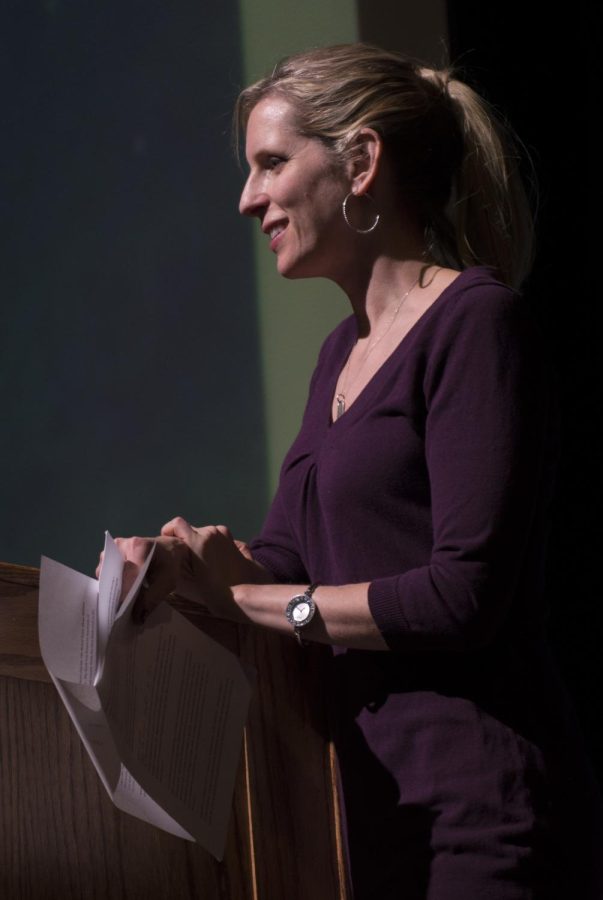Leslie Goldman talks body image: ‘You have nothing to live up to but yourself’
Leslie Goldman, a women’s health writer and body image expert, speaks to a crowd in the KIVA on Monday, February 22, 2016. Goldman came to Kent State with help from Kent State’s Body Acceptance Movement for National Eating Disorder Awareness Week.
February 23, 2016
Leslie Goldman, a women’s health writer and body image expert, flew in from Chicago Monday night to help Kent State’s Body Acceptance Movement kick off National Eating Disorder Awareness (BAM NEDA) week.
Students filed into the auditorium around 7 p.m., ready to receive Goldman’s positive messages on a sensitive topic.
Senior early childhood education major Meesha Lukes said she could feel the tension in the room before Goldman began her presentation.
“I think eating disorders and body image are just such a sensitive and heavy topic for a lot of people,” Lukes said. “Once Leslie started talking, though, she was so positive and excited to be there that the tension was immediately broken and the room was transformed.”
Goldman began by talking about her own eating disorder that developed in college. She told students it was a stereotypical fall. When she started college at University of Wisconsin-Madison she became a small fish in a big pond, struggled in her classes, felt lost and began questioning who she was.
“An eating disorder is not about food, just like sexual assault is not about sex; it’s about power,” Goldman said. “Having an eating disorder is about having something in your life that is so overwhelming and stressful you need something else to put your focus on. Monitoring your calories and workouts can become that focus for many people.”
Goldman said it wasn’t until she had children that she felt free of her body image issues and anorexia. She said she hoped that by speaking to Kent State students and sharing her insights they would not have to wait to have kids of their own to feel confident about their bodies.
“If I could teach one thing to women in college, it would be confidence,” Goldman said. “If you can teach a young woman how to be confident you can really shape her whole world. Knowing yourself, treating yourself with compassion and understanding your worth are so important. If you give yourself permission to tear yourself down you give other people permission to tear you down, too.”
Lukes, 21, said she was happy to hear Goldman talk about self-worth and confidence.
“I hear girls tearing themselves down everyday: My friends, my sister, my mom and even strangers in passing,” Lukes said. “I felt really connected to what Leslie was saying. It was cool because she could talk to us from a place of relevance. She struggled with an eating disorder and body image issues in college, so it was inspiring to learn how she got through it and to see who she is now.”
Goldman began speaking about societal expectations and how the media portrays women.
The mother of two explained to students that they are constantly bombarded with messages and advertisements that expect them to exceed a standard that is unattainable.
“I hope that you leave here today knowing that the images you see in magazines are not real,” Goldman said. “Everything you are exposed to is Photoshopped or manipulated in some way, and it’s not just slimming waists or legs. Magazines Photoshop all aspects that make the model real: Beauty marks, dark circles, bruises, any signs of aging, chest, hair, scars and even teeth. We constantly see these images of how women should look and be treated and we soak that all in.”
Goldman continued on about the positive changes taking place in society: The lingerie line Aerie launched their #AerieREAL campaign promising their advertisements are Photoshop-free, Barbie created three different body shapes for their collection and Sports Illustrated featured plus-size model Ashley Graham on the cover of their swimsuit edition.
Goldman said these are positive changes for our society and means women and men are being exposed to more diversity in the images they see. She said the expectation of how women should look and be treated can start to shift.
The Chicago native closed her presentation by giving three tips on how to be confident and happy: Create a greatest hits list of all the things you are most proud of from the last week or month, pay someone else a compliment —it will lift your spirits—and lastly, don’t listen to your “jerk brain.” She said you are smart and pretty and don’t let your brain tell you other wise.
Kaela Edwards, BAM NEDA week director, said after planning the event for months, she couldn’t have been happier with the turnout and overwhelmingly positive response.
“Leslie was at the top of our guest speaker list,” Edwards said. “She was just great. She had the background, the expertise and everyone loved what she was saying. Everything she talked about fell in line so well with what BAM believes and we couldn’t have asked for anything more.”
Gabrielle Gentile is a recreation and fitness reporter for The Kent Stater. Contact her at [email protected].












